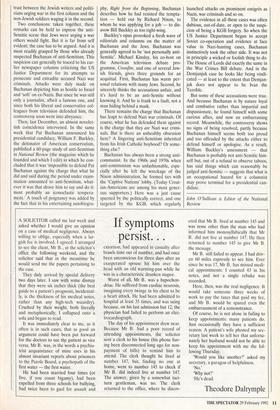If symptoms persist. . .
A SOLICITOR called me last week and asked whether I would give an opinion on a case of medical negligence. Always willing to oblige, especially when a lar- gish fee is involved, I agreed. I arranged to see the client, Mr B at the solicitor's office the following weekend, and the solicitor said that in the meantime he would send me the papers pertaining to the case.
They duly arrived by special delivery two days later. I saw with some dismay that they were six inches thick (the best guide to a patient's prognosis, incidental- ly, is the thickness of his medical notes, rather than any high-tech wizardry). Crushed by their weight, both literally and metaphorically, I collapsed onto a sofa and began to read.
It was immediately clear to me, as it often is in such cases, that as good an argument could have been put forward for the doctors to sue the patient as vice versa. Mr B. was, in the words a psychia- trist acquaintance of mine uses in his almost invariant reports about prisoners to the Parole Board, a psychopath of the first water — the first water.
He had been married four times (or five, if you count bigamy), had been expelled from three schools for bullying, had twice been to gaol for assault and extortion, had appeared in casualty after brawls time out of number, and had once been unconscious for three days after an exasperated spouse hit him over the head with an old warming-pan while he was in a characteristic drunken stupor.
Worst of all, Mr B. was a hypochon- driac. He suffered from cardiac neurosis, imagining every twinge in his chest to be a heart attack. He had been admitted to hospital at least 35 times, and was suing because, on his last admission but 12, the physician had failed to perform an elec- trocardiograph.
The day of his appointment drew near. Because Mr B. had a poor record of attending appointments, the solicitor sent a clerk to his house (his phone hav- ing been disconnected long ago for non- payment of bills) to remind him to attend. The clerk thought he lived at number 147, but, finding no one at home, went to number 145 to check if Mr B. did indeed live at number 147. The answer, given by a somewhat taci- turn gentleman, was no. The clerk returned to the office, where he discov- ered that Mr B. lived at number 145 and was none other than the man who had informed him monosyllabically that Mr B. did not live at number 147. He then returned to number 145 to give Mr B. the message.
Mr B. still failed to appear. I had driv- en 60 miles expressly to see him. Ever since he was 17, Mr B. has missed medi- cal appointments: I counted 43 in his notes, and not a single rebuke was recorded.
Here, then, was the real negligence. It would take someone three weeks of work to pay the taxes that paid my fee, and Mr B. would be spared even the embarrassment of a remonstrance.
Of course, he is not alone in failing to keep appointments: many patients do. Just occasionally they have a sufficient reason. A patient's wife phoned my sec- retary last week to tell her that unfortu- nately her husband would not be able to keep his appointment with me the fol- lowing Thursday.
'Would you like another?' asked my secretary, a paragon of helpfulness.
'No.'
'Why not?'
'He's dead.
Theodore Dalrymple


















































 Previous page
Previous page